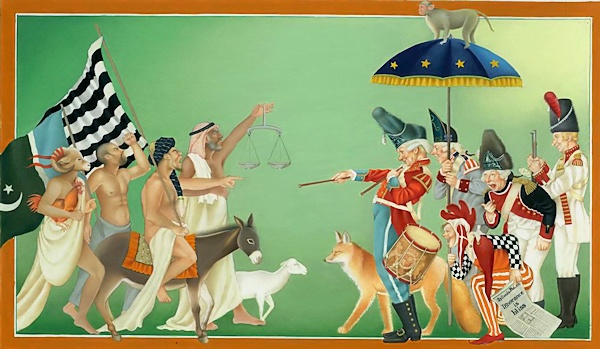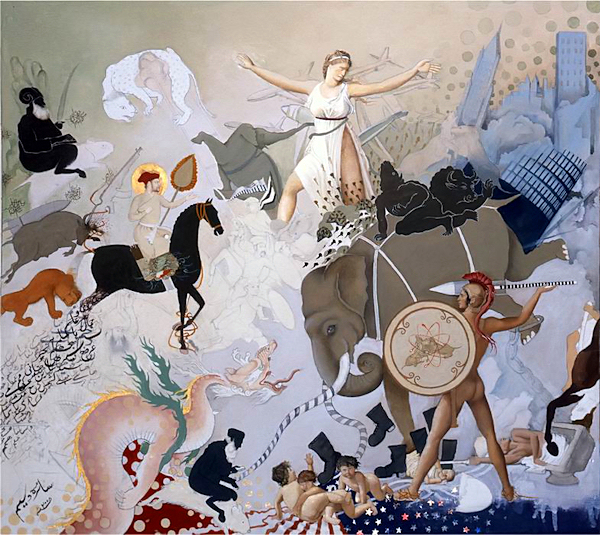A Question of Values, by Morris Berman
A review of A Question of Values, by Morris Berman
 Diogenes the Cynic, Raffaello Sanzio
Diogenes the Cynic, Raffaello Sanzio
The job of the truth is just to be the truth, not to make you feel good. Morris Berman
Morris Berman describes himself as an “innovative cultural historian and social critic”, the first adjective suggesting, perhaps, a desire to depart from some assumed academic norm. His early training was in mathematics and the history of science, his first book being Social Change and Scientific Organisation (the Royal Institution, 1799-1844). In this early work (1978), Berman had already mastered the difficult art of distilling detailed historical information into a readable account of the interaction between science and society in that most formative period of the industrial revolution. In his The Re-enchantment of the World (Trilogy on Human Consciousness. 1981-2000) he uses his knowledge of the history of science to address some of the problems created by science.
Western life seems to be drifting toward increasing entropy, economic and technical chaos, ecological disaster and ultimately, psychic dismemberment and disintegration.
This pessimistic tone is carried through into his second Trilogy on the American Empire, which culminates with Dark Ages America: The Final Phase of Empire (2006), written during the most destructive phase of the Bush Administration’s faux war on terror. Berman’s central idea is that the USA was mirroring the Decline of the late Roman Empire and that the country had moved into a medieval phase where torture was openly sanctioned by the state. Contributing factors were mass surveillance of the population and a severe decline in general educational standards. The New York Times reviewer (‘weird woman’ Michiko Kakutani) screamed like a stuck pig on receiving the news that “the American people are stupid, ignorant, violent and greedy, and that they get the government they deserve.” The rest of her review is worth reading in the light of subsequent events, which confirm that Morris Berman’s criticisms have become conventional wisdom among the genuine critics of the American Empire. The author can be seen discussing Dark Ages America: The Final Phase of Empire in this C-Span video.
 Ignorance is Bliss, Saira Wasim
Ignorance is Bliss, Saira Wasim
A Question of Values comprises 20 essays of varying length divided into four Parts: Lament for America, Mind and Body, Progress True and False and Quo Vadis. It is significant that the author wrote these essays, many published periodically on his blog and in magazines, after moving to Mexico. He felt that America “had no heart, it was a callous place, with a death instinct hanging over it”.
Berman’s position is that he has examined the facts and drawn his conclusions from them, as one would expect from a social scientist, but is not in any sense a political activist. This claim sets him apart from Howard Zinn, for example, and a host of well-known political bloggers intent on both criticising US governments and bringing about radical change. Their message, which has been established since the disastrous turn of the century, is substantially the same as Berman’s, and constitutes a counter version of the social and political realty to the grand narrative of the established media and government agencies that underlie the beliefs of the majority of Americans.
The credibility of this alternative media ranges across a wide spectrum of respectability from Alex Jones, through the likes of John Pilger to Noam Chomsky. In this context, Morris Berman has a relatively low Internet profile, and has avoided the fate of persona non grata enjoyed by many other radical critics of US society. Berman’s essays constitute a well-grounded fragment of this grand narrative but leave out most of the conspiracy theories associated with the post-9/11 world.
The title of Part I, Lament for America, suggests that there was a time when the USA did conform to its idealistic image of a ‘light on the hill’ and a bastion of democratic and liberal values that the world should emulate. Despite the pessimistic tone of the essays, one can detect the longing for a better society based on substantial values rather than the inhuman ones that underpin capitalist materialism. Part II, Mind and Body, shows us the other side of Morris Berman, which is monkish and contemplative, appreciative of the spiritual and artistic side of life, which he sees as being depreciated in modern society.
In Part III, Ch2 – The Moral Order, the decay of values and the moral malaise of modern America is plainly stated in a quotation by the German sociologist George Simmel:
If you make money the centre of your value system, then finally you have no value system, because money is not a value.
Morris Berman explains that there is a conflict between the technical order of modern society and the moral order, which has become marginalised in the transition from primitive societies, through medievalism to our own technical and bureaucratic age. He sees movements such as Communism, Fascism, Existentialism and Postmodernism as abreactions and attempts to restore traditional values. The author sees no hope that America’s lack of culture and shallow values will lead to a moral renaissance, concluding:
There is no real meaning in the corporate-consumer state, which is at once empty and idiotic. There is no record of a dying civilisation reassessing its values (or lack of values, in our case) and altering its trajectory.
 Plea for Peace, Saira Wasim
Plea for Peace, Saira Wasim
Morris Berman is a careful scholar who draws upon a broad range of historical, sociological and literary sources. As the son of Jewish immigrants, he does not shrink from criticism of current Israeli policy but pays his respects to the long tradition of Jewish thought from the Torah to Isaiah Berlin. In Ch25 Tribal Consciousness and Enlightenment he makes the surprising assertion that Judaism was the most notable attempt to break out of the ‘viral trance’ of the ancient Mesopotamian and Egyptian culture but itself constituted a new virus.
Judaism became Pharasaism, Christ becomes St Paul becomes the Vatican, the Reformation becomes Protestant rigidity, and New Age spirituality becomes Oprah and Chopra.
In this chapter, Berman reveals his allegiance to enlightenment values, and tackles the knotty philosophical problem of objectivity. The transmission of culture through Dawkins’ memes seems to doom every philosophical stance to an intellectual trap from which its believers cannot escape. He suggests that the Enlightenment tradition has never really been tried and cites the dire state of popular American beliefs as proof that it has not:
59% of its adult population sitting and waiting for the Rapture and the Second Coming, 29% thinking that the sun revolves around the earth or not knowing which revolves around which, and 45% believing that extra-terrestrials have visited the planet during the past year
Berman confesses that he does not know if the trance can be broken but points out that philosophers like Peter Singer and John Rawls do not examine how people actually behave but only how they ought to do so.
These essays are no mere journalistic commentaries on the present malaise of modern societies, but draw upon scholarly knowledge of history, sociology and the history of science established in his earlier works. Neither are they Spenglerian ramblings rooted in some unstated mystical beliefs, but rather an expression of his own well examined beliefs inherited, mimetically dare I say, from his personal history. The essays are very readable and not bogged down in fussy academic details and should reward the reader both with facts and ideas about modern society.
A possible criticism is that the essays were written over a long period of time and range too widely, although their general focus is clearly on the political, economic and social problems facing America today. Like Diogenes, Morris Berman does not shrink from speaking truth to power and accepts the consequence of not being lauded by the establishment. Unlike the Greek cynic, he prefers the relatively civilised comforts of Mexico to the metaphorical barrel of a declining Empire. Readers can read the final essay of A Question of Values – A Cellular World, which was published in Escape into Life in August 2010.
A Question of Values, Morris Berman, Amazon
 Tony Thomas was born in England in 1939, and is a retired bureaucrat living in Brisbane, Australia. He has an Australian wife, two adult daughters, a dog and a cat. He holds a degree in economics from the University of Queensland. His interests are catholic, and include: philosophy, writing fiction, poetry, and political blogging.
Tony Thomas was born in England in 1939, and is a retired bureaucrat living in Brisbane, Australia. He has an Australian wife, two adult daughters, a dog and a cat. He holds a degree in economics from the University of Queensland. His interests are catholic, and include: philosophy, writing fiction, poetry, and political blogging.





Mr Berman sounds like an interesting man with “apocalyptic” visions of America. I agree that we USA are in a bad way, both economically and fighting a crazy war! However I disagree with his negative views of Israel. Israel’s enemies simply want to “Auschwitz” all Jews! If Israel has to be critisized about being “paranoid” of the Pogroms that their enemies want to do everyday to them, and sometimes they over react, I would point out that we in the USA went 4000 miles to fight those that did 9/11. And as for Noam Chumpsky..the anti Jewish/anti zionist Jew, we Jews have enough Jew haters that are non Jews!!
We Jews made a big mistake when Abraham told the pagan world we found God! It was all dowhill from then on! On top of that Jews said people have to be decent and good to each other! What Chutzpah! No wonder the anti Semite hates us! It created the “Blame the Jews for everything ” club.